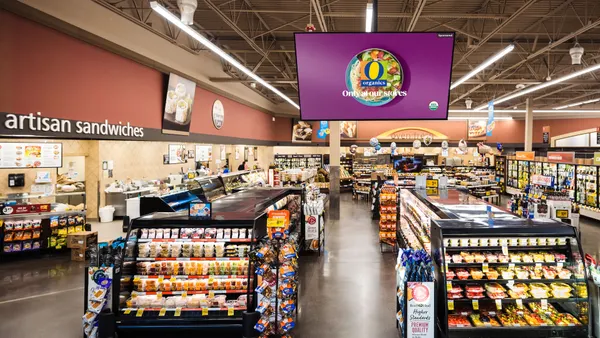Brief:
- Amazon is extending its Alexa voice assistant to products such as earbuds, finger rings and eyeglasses as the online retailer aims to bring its technology into people's everyday lives. During an event yesterday, the e-commerce giant revealed more than a dozen voice-powered devices including a high-quality speaker with 3D sound, an in-home motion sensor and an oven that also works as a microwave and air fryer.
- Amazon's voice-powered Echo Buds cost $129, less than the $159 price of Apple's AirPods that currently have a 53% share of the global earbud market, per Counterpoint Research. Echo Buds users will need to keep their smartphone nearby to talk to Alexa, Amazon said. Amazon's lightweight Echo Frames are eyeglasses equipped with microphones and speakers to talk to Alexa, while the Echo Loop ring also has voice-powered features. The products are currently available on an invite-only basis. Amazon introduced more privacy controls for Alexa and the first celebrity voice setting, letting users change the virtual assistant to sound like actor Samuel L. Jackson. New Alexa features will be rolled out to select new and existing Alexa devices in the coming months.
- Amazon introduced a wireless network called Sidewalk that aims to extend the reach of its connected-home products. The network will use 900-megahertz spectrum with a range of as much as one mile, and connect products in Amazon's Ring security network. Sidewalk also will connect to new gadgets such as Ring Fetch, a dog-collar attachment due to be released next year that can track pets.
Insight:
Putting Alexa into more devices helps Amazon keep customers in the Alexa ecosystem as interest in voice-enabled connected devices grows, potentially keeping customers from connecting on a platform that is mediated by rivals like Google, Apple and Samsung. Less clear is how the new devices will help mobile marketers to connect with consumers unless they're familiar with ordering products and services through Alexa, which hasn't led to the development of a killer app. The expansion also helps Amazon to collect more consumer information that can be used improve product suggestions on its e-commerce site, and to support its burgeoning digital ad sales business.
Each of Amazon's competitors has strengths and weaknesses in creating a seamless experience among mobile, smart-home, in-car and voice-powered devices. Amazon's attempt to market a smartphone ended in failure, but its Echo smart speakers helped to carve out a new category of voice-powered devices that were a big hit with consumers. It remains to be seen whether Amazon can repeat that success with other Alexa-powered gadgets such as earbuds, eyeglasses and home appliances.
Amazon introduced five new Echo smart speakers, including the higher-quality Studio version with 3D sound priced at $199.99, undercutting the prices of the Google Home Max and Apple's HomePod. Amazon faces its biggest threat in the smart-speaker category from Google, the search giant that developed its voice-powered Google Assistant for mobile and smart-home devices. Sales of Google's Nest device will surpass Amazon's Echo smart speaker by 2021, Loup Ventures estimated. The venture capital firm said Alexa consistently ranks behind Google Assistant and Apple's Siri in answering questions correctly, according to its tests, which may put Alexa at a disadvantage. Google Assistant already surpassed Alexa's popularity in Europe after adding more languages, researcher IDC said.
Amazon has touted Alexa as a hands-free assistant for home shopping, although the forecasts for voice commerce are somewhat mixed. U.S. consumers who shop by smart speaker is now set to rise 31.6% to 31 million this year, and by another 11.8% to 34.7 million in 2020, researcher eMarketer forecast in July. A separate survey by researcher GfK found that only 8% of consumers have shopped with a smart speaker and plan to do it again, while 36% have never used the voice-powered devices for purchases and don't plan to. Another 8% have tried voice shopping, but won't do it again, the survey found.
Amazon's hardware announcements came a day after the company announced a collaboration with more than 30 companies to let multiple digital assistants be used from one device, another move to shore up Amazon's role in the voice segment. The group includes Bose, Intel, Microsoft, Qualcomm, Salesforce.com, Sonos and Verizon, and aims to give customers flexibility with interoperable voice services. Amazon's key rivals for virtual assistants — Apple, Samsung and Google — aren't part of the voice interoperability initiative.











